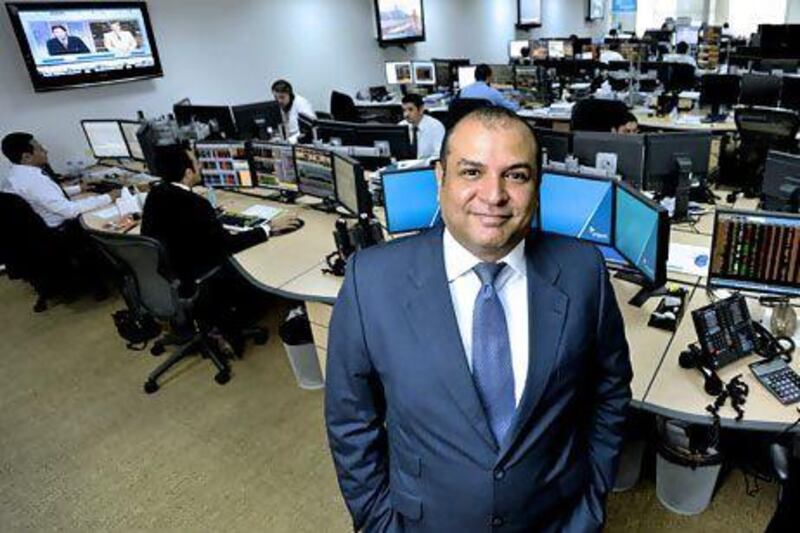Riad Meliti likes to think inside the box. That is not to say he is conventional or orthodox, but rather it explains the basic business philosophy of Arqaam Capital, the investment bank he founded and of which he is chief executive.
"The box" in this instance is a geographical reference. Mr Meliti illustrates it with a passable drawing on a whiteboard of a map of Europe, Africa and Asia, with the bottom half of the map ruled off in a rectangle extending from Indonesia to Morocco, and from Turkey to South Africa.
"There are too many smart minds focused on the Brics," he says, referring to the acronym for the high-growth markets of Brazil, Russia, India and China. "We are looking instead for the greatest opportunity."
He says the average growth rate in "the box" is 6 per cent, way ahead of Europe and the United States, and decent in comparison with the Bric countries.
Arqaam was set up in early 2008 - hardly auspicious timing - but was the result of a business plan that had been in development for some years before.
Mr Meliti, born in Libya and educated on the US west coast, has worked for some of the biggest names in investment banking, such as Credit Suisse First Boston, SBC Warburg and Barclays Capital, mostly while based in London.
It was while living in the British capital that the logic of Arqaam became apparent.
"I'd been focusing on Lebanon and Bahrain, and it just occurred to me: why be sitting in London working on a deal involving Beirut and Manama?" he says. "I'd been travelling to Dubai a lot, and saw it as the perfect hub. The Dubai International Financial Centre was the perfect opportunity from a logistics and regulatory perspective."
The bank launched with four staff, and after four years of a resonating global financial crisis, it has 110. "We had conviction in our macro view, which helped put the short-term volatility into context. At no point over the past four years did Arqaam's growth stop expanding, and at no time did revenues fall."
How did he pull this off?
"By grabbing market share by more than the rate of contraction in the market. Average revenue growth has been around 30 per cent per year," he explains.
Arqaam does not publish official financial figures. But the industry consensus is that it has edged its way into the top part of the indigenous Middle East investment banking league. It says it accounted for 25 per cent of business on Nasdaq Dubai last year, and in July, transacted 10 per cent of all business on the Dubai Financial Markets.
The next phase is to finalise plans to start businesses in Saudi Arabia and Turkey. Saudi investors have 25 per cent of the bank's capital - in a list of the mostly regional investors who backed the start-up with US$140 million (Dh514.2m).
An Egyptian business "goes live" in the first quarter of next year, says Mr Meliti. Libya is also a target, with the acquisition of Rashad in October.
Stage two of the bank's plans for "the box" involves launching start-ups in sub-Saharan Africa. "Corporate finance first, followed by research," says Mr Meliti.
Stage three aims to establish a permanent presence in Indonesia, Thailand and Malaysia, perhaps with add-ons in Sri Lanka and Bangladesh.
"Indonesia is the next China. I believe there is a shift in global capital flows to frontier markets that have higher growth rates than either developed or emerging markets, and which are not driven by leverage. We are an investment bank for frontier and emerging markets, not just a Middle East bank," he says.
"Our main customers are the sophisticated global institutions. We have a list of 500 institutional clients. Some of the names are mind-boggling," he says.
At a time when some banks are getting rid of businesses they regard as unprofitable, Arqaam offers the full spectrum of investment banking disciplines, in seven segments: treasury, brokerage, credit, derivatives, corporate finance, asset management and custody.
There is also a commitment to research, with 20 full-time analysts based in Beirut in a building that could eventually house 100. "We don't charge for the research. It provides credibility with the client base. We are independent and transparent," he says.
Mr Meliti defends the track record of investment banks, much criticised since the financial crisis.
"They were very efficient for decades. Shareholders did very well from them," he says. "The problem came with the Basel II regulations, which led to the growth of asset-backed securities rated by the likes of Moody's and S&P. But regulation is key to ensure distortions do not occur, for example, as we saw with subprime securities or with the wrong compensation models."
"Our whole ethos at Arqaam is that we are a meritocracy, with a flat management structure where the benefits of hard work are recognised."
[ fkane@thenational.ae ]





